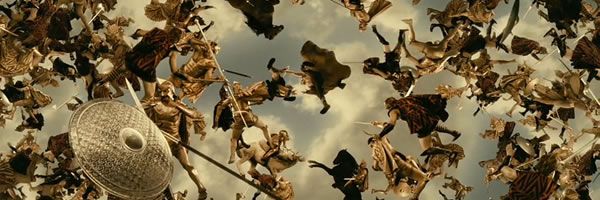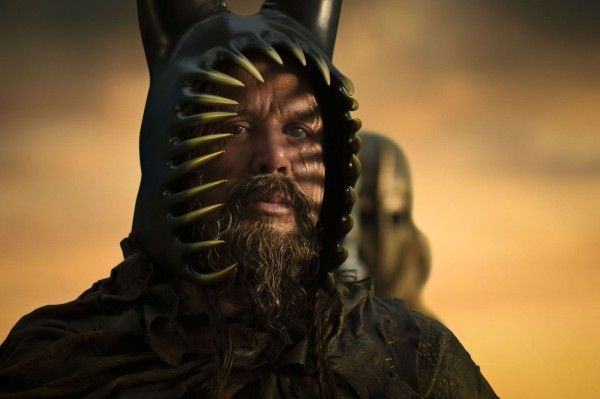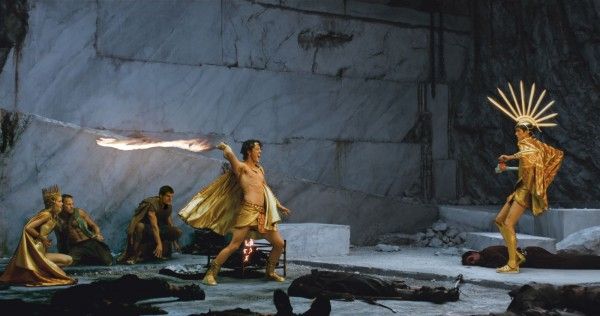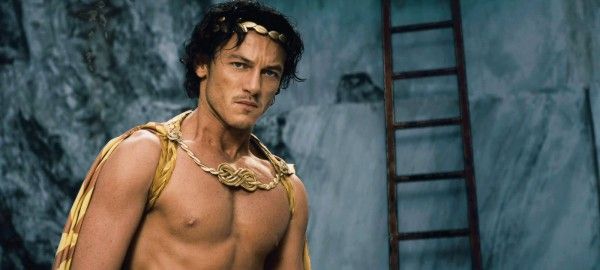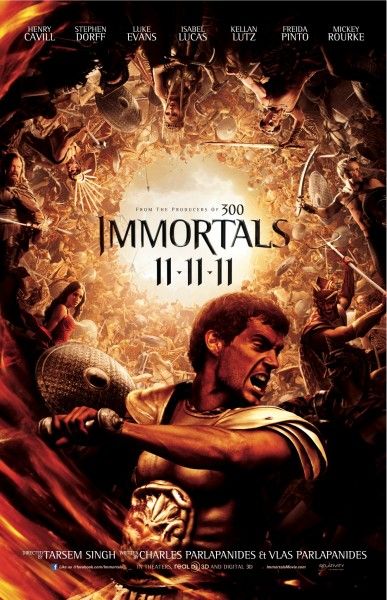"The director is God." It's a saying that has been applied to directors of both stage and screen. Directors (theoretically) control every aspect of a production and they marshal armies of various departments to bring forth a vision. Director Tarsem Singh took the saying as the subtext for his new movie, Immortals. Singh has always been an indulgent visual stylist, but with Immortals, he has bent a script to create a shining tribute to his own genius. On the page, the movie is a standard "Hero from humble beginnings", but in the hands of Singh, it becomes lush, outlandish, baffling, and above all, vainglorious.
King Hyperion (Mickey Rourke) is on a rampage across Greece so he can find a magical bow that will unleash the Titans and bring down the gods. Hyperion hates the gods because he needs someone to blame for the death of his family, but he also wants to extend his legacy by taking the Attila the Hun route of extending his bloodline and cutting off the bloodlines of others. It's clearly a half-assed motivation that's been tacked on to the character's personality. Rourke doesn't care either way since he sleepwalks through the entire movie and treats a mission to bring down the gods with the same enthusiasm as an administrator filing paperwork.
Because they refuse to directly meddle in the lives of mortals, the gods hope that the strong and honorable peasant Theseus (Henry Cavill) will find the bow first and bring down Hyperion. Zeus (Luke Evans) is perfectly willing to disguise himself as a grandfatherly figure (John Hurt) and mentor Theseus for a decade, but trying to trick Hyperion into falling off a cliff is a task too great for any being. When Hyperion personally comes down to destroy Theseus' village of about fifty people, the bored king slaughters Theseus' mother in front of her son's eyes and then sentences the young man to a life in the salt mines. Once there, Theseus meets up with an oracle (Freida Pinto) and a roguish thief (Stephen Dorff), as well as some unnamed characters who clearly are not going to see how this all pans out. The whole plot is to get Theseus back to Hyperion while the gods twiddle their thumbs and wait for the climatic battle with the titans.
The characters are one-dimensional, the plot is threadbare, but the movie does lay out a very clear thesis statement by opening with the Socrates quote: "All men's souls are immortal, but the souls of the righteous are immortal and divine." The story wants us to root for Theseus, a simple-but-goodhearted guy who does the right thing, but Singh couldn't care whether or not Theseus leads the people to victory or even if he defeats Hyperion. He cares that Theseus learns to believe in the gods, and that we witness the power of those gods. Singh doesn't care about being righteous. He cares about being divine.
A good director serves the story, but it takes a director like Singh to make the story serve him. Everyone will walk away from Immortals commenting on the eye-popping visuals and vibrant costumes (which will probably earn costume designer Eiko Ishioka an Oscar nomination). But most of the art direction and costume designs tell us nothing about the themes and character beyond "Singh sees the world in an unusual way." Occasionally, that way is exciting and clever. It's a smart point to make the gods youthful and attractive because why wouldn't they choose to take that form? Singh's spin on the myth of Theseus, the Minotaur, and the maze is brilliant and if all of Immortals was as imaginative and thoughtful, the movie would be a smashing success.
Unfortunately, most of it grows from the simple-minded thinking of "Because it looks cool." I wondered why Hyperion was so adamant about bringing down the gods or expanding his bloodline when his true passion was clearly the design of ornate masks. Why does Hyperion's helmet have bunny ears? Why did he bedazzle his mask? What does it tell us about the character? Singh would rather you just admire the craftsman ship and "originality" of his vision, and not care about the why.
Occasionally, Singh gets brilliant. Almost everything with Theseus is shot in brown colors filled with dirt and grime, and the only outstanding visual flourish is one long take of our hero striking down his enemies as he moves down a hallway. When it comes to the gods, Singh lets loose. He delivers one of the best and most cartoony action scenes of the year when the gods finally do battle. There may as well be a combo meter in the top left corner of the screen when the gods wreak bloody destruction and smash apart the everythings of their enemies. Even their violence is beautiful, so who cares that their plans are idiotic and that their helmets are distractingly ridiculous?
Immortals deserves credit for trying to breathe life into what would otherwise be a bland and forgettable sword-and-sandals story. The result is silly and undercooked when it comes to characters and plot, but the movie is fascinating for what it says about its director. If Tarsem Singh could have gotten away with casting himself as Zeus, he probably would have done it.
Rating: C

